

VIACM / YOUTUBE Round2. Viacom v. YouTube Postscript—Copyright Infringement, Social Media and the Blurred Lines of the Digital Millennium Copyright Act's Safe Harbors. By Fernando A.
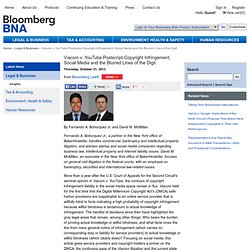
Bohorquez Jr. and David M. McMillan Fernando A. Bohorquez Jr., a partner in the New York office of BakerHostetler, handles commercial, bankruptcy and intellectual property litigation, and advises startup and social media companies regarding business law, intellectual property and internet liability issues. David M. More than a year after the U.S. 2012_Viacom. An Interview with Andrew Shaw of PRS for Music on Negotiating with Google, a guest post by Jonathan David Neal « MUSIC. [Editor Charlie sez: This post is by Jonathan David Neal and originally appeared in The Score, the membership publication of the Society of Composers and Lyricists.
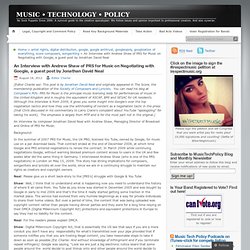
You can read his blog at Composer's POV. PRS for Music is the principal music licensing body for performances of music in the United Kingdom and is roughly the equivalent of ASCAP, BMI and SESAC for UK residents. Although this interview is from 2009, it gives you some insight into Google's over the top negotiation tactics and how they use the withholding of content as a negotiation tactic in the press (that Chris discussed in his commentary to Larry Crane's complaint about YouTube "apologizing" for taking his work). Viacom International, Inc. v. Google, Inc. USCA Second Circuit, April 5, 2012 Click here for a copy of the full decision.
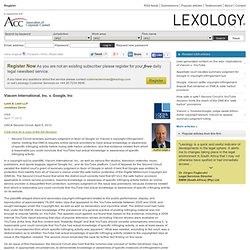
Second Circuit reverses summary judgment in favor of Google on Viacom’s copyright infringement claims, holding that DMCA requires online service providers to have actual knowledge or awareness of specific infringing activity before losing safe harbor protection, and that evidence existed from which a reasonable jury could conclude that YouTube had actual knowledge or awareness of specific infringing activity.
User-generated content on the web: implications of Viacom v. YouTube. On April 5, 2012, the United States Court of Appeals for the Second Circuit issued its ruling in Viacom Int'l, Inc. v.
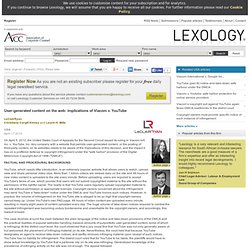
YouTube, Inc. Any company with a website that permits user-generated content, or the posting of third-party content, on its websites needs to be aware of the implications of this decision, and the impact it has on a proffered defense to copyright infringement under the "safe harbor" provision of the Digital Millennium Copyright Act of 1998 ("DMCA"). YouTube, which needs little introduction, is an extremely popular website that allows users to watch, upload, view and share personal video clips. More than 1 billion videos are viewed daily on the site and 48 hours of new video content is uploaded to the site every minute. The Viacom/YouTube Debate. Viacom v Google - the next installment. The 2nd US Circuit Court of Appeals has reversed (Thursday 4th April) the June 2010 lower court ruling from Judge Louis Stanton in favour of YouTube, which resulted from the $1 billion lawsuit filed by Viacom, the English Premier (football) League and others in 2007 to stop the posting of clips from programmes like the Daily Show and SpongeBobSquarePants amongst 79,000 copyrighted works, giving YouTube DCMA protection.
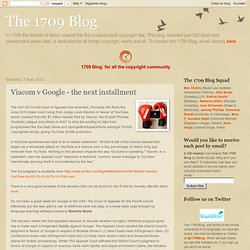
Second Circuit Ruling in Viacom v. YouTube Is a Bummer for Google and the UGC Community. By Eric Goldman Viacom International, Inc., v.
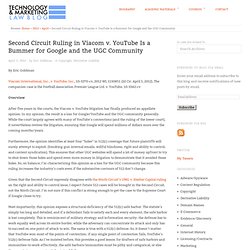
YouTube, Inc., 10-3270-cv, 2012 WL 1130851 (2d Cir. April 5, 2012). The companion case is the Football Association Premier League Ltd. v. YouTube, 10-3342-cv Overview. Lawyer who defended YouTube against Viacom joins MegaUpload defense. MegaUpload is loading up on high-profile lawyers.
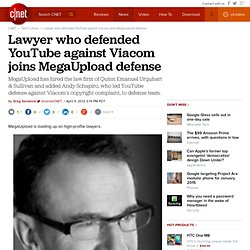
The cyberlocker service has added Andrew Schapiro, the attorney who led the YouTube defense that won summary judgment in the video-sharing service's initial copyright trial against Viacom, MegaUpload attorney Ira Rothken told CNET today. Schapiro is part of Los Angeles-based Quinn Emanuel Urguhart & Sullivan, which MegaUpload hired to represent the company against criminal copyright charges. Rothken is a well-known Silicon Valley lawyer and the man who is also leading MegaUpload's worldwide defense. Judge revives Viacom copyright suit against YouTube.
A federal appeals court judge has revived a $1-billion copyright infringement lawsuit by Viacom Inc.against Google Inc.'sYouTube, reopening a high-profile clash between old and new media.
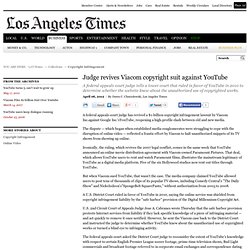
The dispute — which began when established media conglomerates were struggling to cope with the disruption of online video — reflected a frantic effort by Viacom to halt unauthorized snippets of its TV shows from showing up online. Ironically, the ruling, which revives the 2007 legal conflict, comes in the same week that YouTube announced an online movie distribution agreement with Viacom-owned Paramount Pictures. That deal, which allows YouTube users to rent and watch Paramount films, illustrates the mainstream legitimacy of YouTube as a digital media platform. Viacom vs YouTube : la procédure judiciaire réserve encore des surprises. Revirement (symbolique ?)
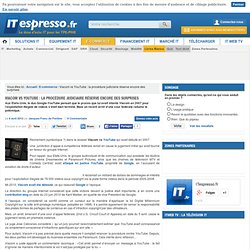
Dans le dossier Viacom vs YouTube qui avait débuté en 2007. Une juridiction d’appel à compétence fédérale remet en cause le jugement initial qui avait tourné en faveur du groupe Internet. Pour rappel, aux Etats-Unis, le groupe audiovisuel et de communication (qui possède les studios de cinéma Dreamworks et Paramount Pictures, ainsi que les chaînes de télévision MTV et Comedy Central) avait attaqué en justice YouTube, propriété de Google, en l’accusant de violation de droits d’auteur. Il réclamait un milliard de dollars de dommages et intérêts pour l’exploitation illégale de 79 000 vidéos sous copyright via la plate-forme vidéos dans la période 2005-2008. Second Circuit addresses DMCA safeharbor in landmark case. A new Second Circuit decision could change the way some service providers conduct business on the internet, imposing a greater burden to assess specific infringing activity.
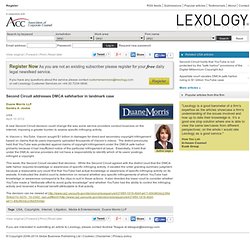
In Viacom v. YouTube, Viacom sought $1 billion in damages for direct and secondary copyright infringement based on claims that its users improperly uploaded thousands of Viacom’s videos. The district previously held that YouTube was protected against claims of copyright infringement under the DMCA safe harbor primarily because it had insufficient notice of the particular infringement at issue. Essentially, it held that under the DMCA, service providers did not have a responsibility to identify which of its users' postings infringed a copyright. This week, the Second Circuit vacated that decision.
Legal, Tax, EHS, and HR Expert Information & Analysis. By Tamlin H. Bason Red flag knowledge of infringement under Section 512(c) Digital Millennium Copyright Act is determined by a subjective reasonable standard, the U.S. Court of Appeals for the Second Circuit held April 5, affirming the district court's interpretation that general awareness of infringement cannot trigger an internet service provider's duty to remove content (Viacom International Inc. v. YouTube Inc., 2d Cir. No. 10-3270, 4/5/12). Viacom v. YouTube: The Second Circuit’s Decision. On Thursday, the Second Circuit Court of Appeals decided Viacom v. YouTube (PDF of decision). The decision has spurred a range of reactions, with both sides publicly claiming a sort of victory; others have stated the decision “is a bummer for Google and the UGC community“, is “mostly good (for the internet and innovation)“, is a win for Viacom, or is a mixed victory.
Regardless, the opinion is sure to be an important decision in the DMCA pantheon for years to come. VIACOM INTERNATIONAL, INC. v. YouTUBE, INC., Court of Appeals, 2nd Circuit 2012. About this page Our systems have detected unusual traffic from your computer network. This page checks to see if it's really you sending the requests, and not a robot. Why did this happen? This page appears when Google automatically detects requests coming from your computer network which appear to be in violation of the Terms of Service. The block will expire shortly after those requests stop. This traffic may have been sent by malicious software, a browser plug-in, or a script that sends automated requests. Sometimes you may be asked to solve the CAPTCHA if you are using advanced terms that robots are known to use, or sending requests very quickly. IP address: 188.165.248.41Time: 2014-04-11T07:18:10ZURL: Viacom's copyright suit against YouTube gets a second chance from the Second Circuit. The Second Circuit has ruled that the summary judgment granted last year in favor of YouTube in a copyright suit brought by Viacom and other content owners was premature.
The District Court had found that YouTube was protected by one of the Digital Millennium Copyright Act’s (“DMCA”) safe harbor provisions, namely, 17 U.S.C. § 512(c), which shields online service providers from liability for infringing content posted by users. Although it agreed with some of the District Court’s central reasoning, the appellate court has sent the case back for reconsideration on a number of issues. “Red Flag” Knowledge Applies to Specific, Identifiable Infringement. Viacom wins appeal in YouTube copyright case - Tech Talk. (CNET) Viacom has won an appeal in its copyright lawsuit against Google's YouTube, according to court documents. The U.S. Second Circuit Court of Appeals sent the case back to a lower court to determine whether YouTube purposely ignored the infringing material that was posted to the site.
CNET: Viacom sues Google over YouTube clips CNET: Viacom gets another shot in court against YouTube The decision is a setback for technology companies. It negates an earlier decision that set a favorable precedent about responsibility for policing Web sites. In 2007, Viacom accused YouTube, which at that point had recently been acquired by Google, of encouraging users to illegally upload copyrighted clips of movies and TV shows.
Viacom v. YouTube/Google: Second Circuit Reinstates Viacom’s Copyright Lawsuit, But Largely Affirms Pro-Online Service Provider Holdings. The YouTube Decision: What it means and what happens next. Youtube / Viacom. Willful Blindness, Substantial Influence and Uncertainty in the Law of DMCA Safe Harbors. YouTube Decision Muddies the Water for DMCA Safe-Harbor Law–for Now. Letter from AmeriKat I - Viacom v YouTube (Viacom) Last week the AmeriKat experienced one of those weeks that could only be described as chaotic. Presentations to prepare for, client work deadlines to meet and a flurry of unexpected issues raining down on her like cats, and unfortunately, dogs. When suffering through a week that buries you in a stack of to-do lists and deadlines, it can become easy to lose perspective - especially in a city where one can never see the horizon.
(left - the AmeriKat's face after being caught in last week's rain of deadlines and weather) So when Friday evening finally managed to appear the AmeriKat prowled to the Thames, climbed the Golden Jubilee Bridges, and gazed at the horizon featuring a glowing St.Pauls and the flashing towers of Canary Wharf.